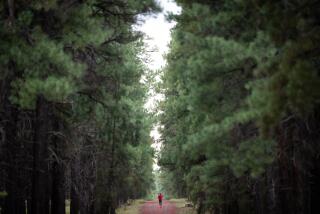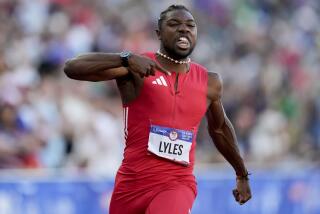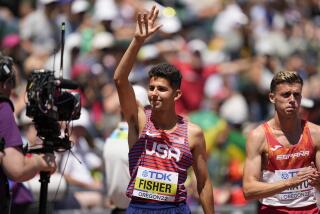He Has Been on Run All His Life
- Share via
At UCLA, he is known as the distance runner with the long-distance name--Mebrahtom Keflezighi, for those bold enough to tackle the full-course, tongue-tangling version; Meb for the rest of us.
He runs for UCLA 12 years after winning the long-distance race of his life--an escape with his family from the tiny, war-ravaged African country of Eritrea, where Keflezighi was born into a nightmare of land mines exploding
in the night and older brothers forced into hiding to avoid kidnapping and conscription into the rival Ethiopian army.
He can chart the path of his global wanderings by the variations made, from country to country, on his cumbersome first name.
In Milan, Italy, where his family first settled in 1985, he was nicknamed “Luciano.”
Because in the Eritrean language of Tigrina, Keflezighi says, Mebrahtom “means ‘light.’ ‘Let there be light.’ ”
In San Diego, where his family next landed in 1987, it became Tom.
Because “the kids in the seventh grade just decided to erase everything in front.”
In Westwood, where he has run cross-country and track for the last four years, Keflezighi is known as Meb, or Mo, or, as his coach, Bob Larsen, is fond of introducing him, “the first man to double in the 5,000 and 10,000 meters at the NCAAs in 12 years.”
Last spring, running three races in four days, Keflezighi won NCAA championships in the 5,000- and 10,000-meter events--a double that puts Keflezighi in the company of “a Who’s Who of distance runners,” Larsen says, a list that includes Henry Rono and Steve Prefontaine.
Monday, at Furman University, Keflezighi will try to go one step beyond as he competes in the NCAA cross-country championships. Keflezighi is one of four leading contenders, along with Adam Goucher of Colorado, Ryan Wilson of Arkansas and Kevin Sullivan of Michigan.
LIFE DURING WARTIME
How Keflezighi got from there to here, from the dirt roads of Eritrea to the all-weather synthetic tracks of the United States, is not the typical African-running-prodigy-gets-visa-and-American-track-scholarship recruiting tale.
Keflezighi never ran as a youngster in Eritrea, unless it was after a homemade soccer ball--bits of plastic stuffed and sewn into a sock--or into bushes at the first shocking sight of an automobile rumbling through town.
He spent his first 10 years in a war zone. Eritrea was in the midst of a 31-year struggle for independence from Ethiopia that finally succeeded in 1993. Keflezighi can recall the miniature land mines, resembling ballpoint pens, that would be strewn across open fields near his village, and the horrific consequences of curiosity.
“It is not something that is pleasant to talk about,” Keflezighi says. “People would see these small pens on the ground and pick them up. The next thing you know, there would be pieces of bodies all over. . . . I can remember hearing explosions at night and walking around the next day. You would see body parts on the ground.”
Keflezighi remembers the night raids of the Ethiopian army, soldiers going from home to home in his village, pounding on doors, looking for any Eritrean males 12 or older to be rounded up, dragged away and trained as Ethiopian soldiers.
“You never knew what was going to happen the next day,” Keflezighi says. “It was a disaster, basically. People were always worried about being picked up by the soldiers. One day, they would come to your house and put you in a line. It was unthinkable.
“Usually they would surround the city. If you looked old enough to go to war, they would put you in a line and take you away.
“I was too young, but I remember my brothers hiding in the bushes. If they saw you and you tried to run, watch out. They had real guns. You heard stories of people being shot in the feet if they tried to run away. It wasn’t safe.”
Keflezighi speaks with sadness, not bitterness, when he says, “I don’t think I had a childhood life. I guess I was in Eritrea until I was 10 and in that time I had maybe two years of school. The rest of the time I was taking care of little cows, cattle.
“I didn’t have a childhood, what you would call a normal American childhood. I never had cartoons in the morning. I was new to technology. No TV, no radio. I was clueless, in a way. The first time I saw a TV was in Italy. It was pretty amazing. ‘Where are all these little things coming from?’ ”
Keflezighi’s family fled to Italy in 1985, several years after his father, Russom, had made his way to Milan, found work and eventually earned enough money to send for the others. Russom escaped on foot, walking at night to avoid detection by the Ethiopian soldiers, until he crossed the border to Sudan, from where he could freely travel to Italy.
After 18 months in Milan, the Keflezighi family moved to San Diego, where, Mebrahtom says, acceptance was tough.
“Everything you want to say, you can’t say it, because I didn’t know the language,” he recalled. “I’d try to make hand gestures, and the kids would make fun of me. They made fun of the way I dressed.”
Then, one day in seventh grade, Keflezighi’s physical education class was timed in running the mile. Keflezighi was clocked at 5 minutes 20 seconds.
“That got you respect,” he says with a grin.
UNDER WHICH FLAG?
Eventually, it also earned Keflezighi a full scholarship to UCLA, where last spring he became the first runner since Brigham Young’s Ed Eyestone in 1985 to win at 5,000 and 10,000 meters at the same NCAA national meet. Three days after winning the 10,000-meter title in 28 minutes 51.18 seconds, Keflezighi held off Goucher and Wilson to win the 5,000-meter championship in 13:44.17.
The UCLA cross-country media guide describes Keflezighi as “the greatest distance runner in school history” and Larsen says, flatly, “I think the potential is there for Meb to be one of the best in the world, top five, in that range.”
And therein lies a problem, or at least a heavy-hearted decision.
Keflezighi applied for U.S. citizenship in March, but Eritrea has kept abreast of its native son’s athletic successes abroad and wanted him to run under the country’s flag at last summer’s World Championships.
Keflezighi, having wound down his training regimen after the NCAA outdoor season and hesitant to jeopardize his chances of one day competing for the United States, declined.
But the choice, some day, before the 1999 World Championships or the 2000 Olympics, will have to be made: To run for Eritrea . . . or the USA?
At the moment, the heavyweight contender is out in front.
“It’s leaning,” is how Keflezighi puts it. “As I get closer to leaving UCLA and becoming a U.S. citizen, I am going to have to find a way to support myself financially.
“In the U.S., I would be able to do that. I could support myself by running with a sponsor. Whereas in Eritrea, there would be no sponsors. Running alone won’t do it. . . .
“Whatever decision I make, some people are not going to be happy. I have to do what’s best for me.”
(BEGIN TEXT OF INFOBOX / INFOGRAPHIC)
Calendar
CHAMPIONS SERIES OF FIGURE SKATING
* Wed.-Sun: NHK Trophy (Nagano, Japan).
* Dec. 19-21: Champion Series Final (Munich, Germany).
ALPINE SKIING WORLD CUP
* Thursday-Saturday: Women’s super G, parallel racing (Mammoth Mountain).
* Nov. 29-30: Men’s super G and downhill (Whistler Mountain, Canada).
* Dec. 5-6: Men’s downhill and super G (Beaver Creek, Colo.).
FREESTYLE SKIING WORLD CUP
* Dec. 5-7 at Tignes, France.
LUGE WORLD CUP
* Saturday-Sunday at Konigssee, Germany.
* Dec. 6-7 at Innsbruck, Austria.
SPEEDSKATING WORLD CUP
* Friday-Sunday: All-around (Berlin).
* Dec. 6-7: All-around (Heerenveen, Netherlands).
* Dec. 13-14: All-around (Hamar, Norway).
CURLING
* Dec. 8-14: U.S. Olympic trials finals (Duluth, Minn.)
More to Read
Go beyond the scoreboard
Get the latest on L.A.'s teams in the daily Sports Report newsletter.
You may occasionally receive promotional content from the Los Angeles Times.






